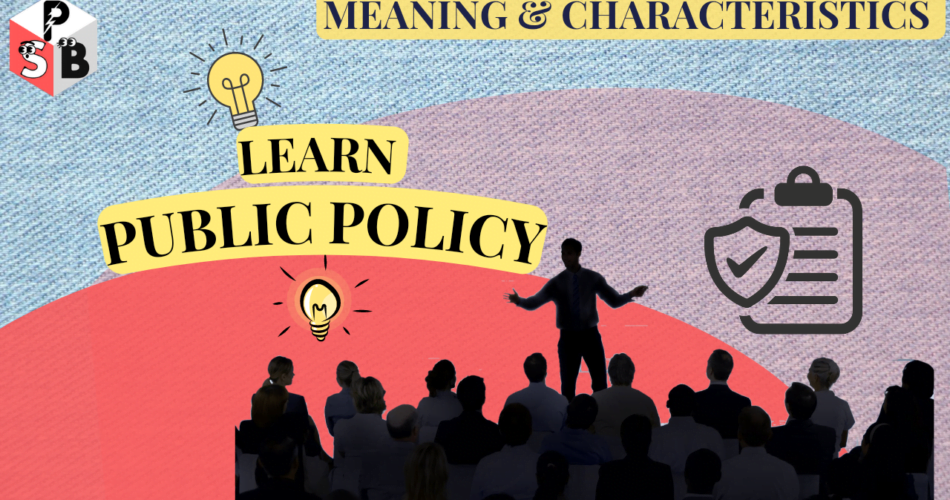

Public Policy making can be characterized as a dynamic, complex, and interactive system through which public problems are identified and countered by creating new public policy or by reforming existing public policy.
Public problems can originate in endless ways and require different policy responses (such as regulations, subsidies, quotas, and laws) on the local, national, or international level.
Public Policy making is a continuous process that has many feedback loops. Verification and evaluation are essential to the functioning of this system.
The Public Problems that influence public policy making can be of Economic, Social, or Political nature. Each system is influenced by different public problem and thus requires different public policy.
In Public Policy making numerous individuals and interest groups compete and collaborate to influence policy makers to act in a particular way.
The large set of actors in the Public Policy process, such as politicians, civil servants, lobbyists advance their aims, including advocating their positions publicly, attempting to educate supporters and opponents, and mobilizing allies on a particular issue. Many actors can be important in the public policy process, however, government officials ultimately choose the ‘Public Policy’, in response to the public issue or problem at hand. In doing so, government officials are expected to meet public sector ethics and take the needs of all stakeholders into account.
Since societies have changed in the past decades the public policy making system changed too. Today, Public Policy making is increasingly goal-oriented, aiming for measurable results and goals, and decision-centric, focussing on decisions that must be taken immediately.
Furthermore, Mass communications and Technological changes have caused the public policy system to become more complex and interconnected. These changes pose new challenges to the current public policy systems and pressure them to evolve in order to remain effective and efficient.
As an academic discipline, Public Policy brings in elements of many social science fields and concepts, including economics, sociology, political economy, program evaluation, policy analysis, and public management, all as applied to problems of governmental administration, management, and operations. At the same time, the study of public policy is distinct from political science or economics, in its focus on the application of theory to practice.
While the majority of public policy degrees are master’s and doctoral degrees, several universities also offer undergraduate education in public policy.
The following Policy schools tackle policy analysis differently;
Traditionally, the academic field of public policy focused on domestic policies. However, the wave of economic globalization which occurred in the late 20th and early 21st centuries created a need for a subset of public policy that focuses on global governance, especially as it relates to issues that transcend national borders such as climate change, terrorism, nuclear proliferation, and economic development.
Consequently, many traditional public policy schools had to tweak their durricula to adjust to this new policy landscape, as well as developed whole new ones.
The School of International Affairs at Pennsylvania State University, for example, was created as a response to a new transnational landscape. The School of International Affairs is grounded on international, policy making, offering interdisciplinary training from various fields, such as law, political science, international relations, geography, sociology, and economics.
A good public policy is one that solves problems without creating a political rift. Wherever it is believed that it can solve a problem without one party disagreeing with its inception, it can go forward without issue. This policy should solve a public Problem without violating the legal boundaries set down by federal, state, and local laws. It must encourage an active citizenry furthermore, as Well as the democratic process.
There must be eight qualities of public policy, which are as follows:
Policy must have a clear purpose and outcome if it is to be of any value to the organisation. It is important that staff recognise the problem that is being addressed through the policy implementation.
It is extremely difficult to implement policy in a situation where people do not perceive there is a need for the specific policy unit to be developed or implement.
If policy is being implemented to support an organisation in its growth and develop it is imperative that policy outcomes are clearly stated so that everyone could understands why the policy has been implemented and what the policy expectations are.
Policy makers must ensure that policies linked to the overall direction and goals of the organisation. The overall framework of the business will provide some strategic direction, and will be important in assessing the direction of the organisational policies.
Policy writers must ensure that the policy supports existing policies and procedures within the organisation. One of the tests of good policy is that it supports the organisation in achieving its goals and objectives. Often time policy through its implementation can, in fact hinder staff in achieving the organisational goals.
Policy should be seen as pillars supporting the structure of an organisation. Policy should be written in such a way that they clear obstacles to staff and enable them to better achieve their full potential.